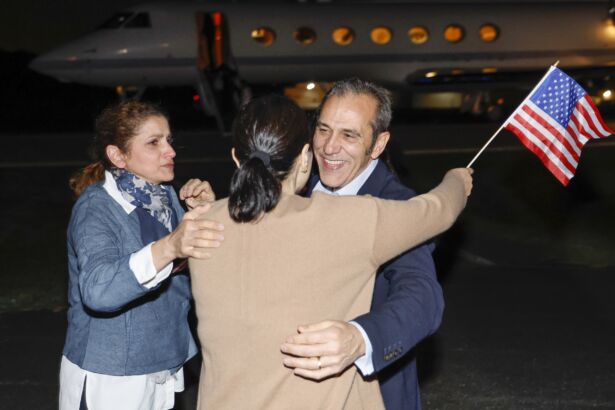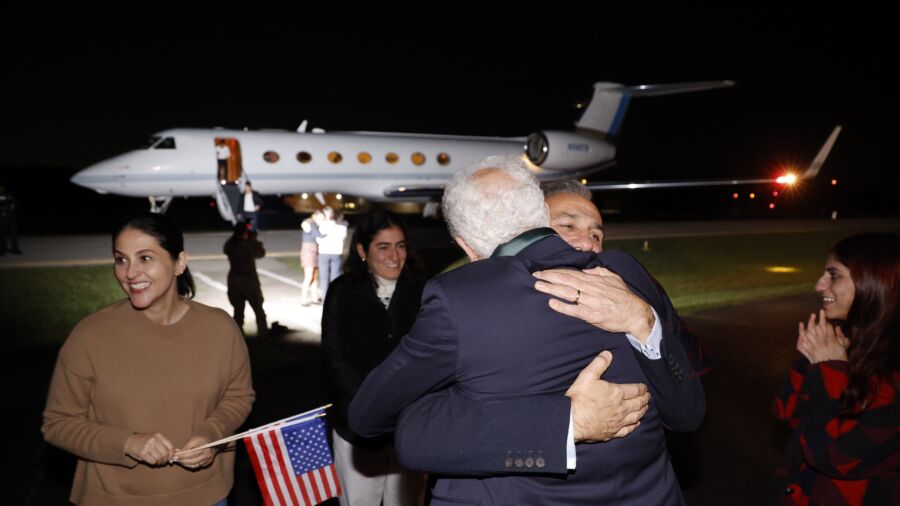WASHINGTON—Americans detained for years in Iran arrived home Tuesday, tearfully hugged their loved ones and declared “Freedom!” after being let go as part of a politically risky deal that saw President Joe Biden agree to the release of nearly $6 billion in frozen Iranian assets.
The prisoners landed at Fort Belvoir, Virginia, with clapping and cheers heard in the predawn hours. Loved ones, some holding small American flags, enveloped them in hugs and exchanged greetings in English and Farsi, the main language of Iran.
“The nightmare is finally over,” Mr. Namazi’s brother, Babak, said at the airport.
“We haven’t had this moment in over eight years,” he added, his arm around his brother and his formerly detained father, Baquer, who had been earlier released by Iran. “It’s unbelievable.”
One of the other freed Americans, Emad Sharghi, received from his sister, Neda, a U.S. flag and a stuffed animal that she had given to their father 30 years ago when he had bypass surgery, a family representative said.
The former prisoners, who flew on the Gulfstream 5 that brought WNBA star Brittney Griner home after her detention in Russia, later posed for a group photograph with their families, calling out: “Freedom!”
The successful negotiations for the Americans’ freedom brought Biden profuse thanks from their families but heat from Republican presidential rivals and other opponents for the monetary arrangement with one of America’s top adversaries.
“Today, five innocent Americans who were imprisoned in Iran are finally coming home,” the Democratic president said in a statement released as the plane carrying the group from Tehran initially landed in Doha, Qatar, on Monday.
Iran’s hard-line President Ebrahim Raisi, on hand for the United Nations General Assembly in New York, suggested the exchange could be “a step in the direction of a humanitarian action between us and America.”
“It can definitely help in building trust,” Mr. Raisi told journalists.
Iran aired footage of the two prisoners who returned to the Islamic Republic as part of the swap, while two will remain in the U.S. and a fifth will go to a third country. The two who returned hugged their families and criticized the U.S. for their sentences.
“The U.S government accused me of having the will to jeopardize U.S interests through disregarding the sanctions. I wonder how the U.S government can accuse someone of a crime by reading his mind?” Reza Sarhangpour Kafrani told Iranian state television.
Mr. Kafrani was indicted in 2021, charged with unlawfully exporting laboratory equipment to Iran and money laundering, though his case had not yet moved to trial.
Also released, according to Nour News, was Mehrdad Ansari, an Iranian sentenced by the U.S. to 63 months in prison in 2021 for obtaining equipment that could be used in missiles, electronic warfare, nuclear weapons, and other military gear.

Tensions are almost certain to remain high between the U.S. and Iran, which are locked in disputes over Tehran’s nuclear program and other matters. Iran says the program is peaceful, but it now enriches uranium closer than ever to weapons-grade levels.
The prisoner release unfolded amid a major American military buildup in the Persian Gulf, with the possibility of U.S. troops boarding and guarding commercial ships in the Strait of Hormuz, through which 20 percent of all oil shipments pass.
The United States did not immediately identify the other two freed Americans. All were released in exchange for five Iranians in U.S. custody and for the deal over the frozen Iranian assets owed by South Korea. The Biden administration said the five freed Iranians pose no threat to U.S. national security.
Two of the imprisoned Americans’ family members, Effie Namazi and Vida Tahbaz, who had been under travel bans in Iran, also were on the plane.
The $5.9 billion in cash released to Iran represents money South Korea owed Iran—but had not yet paid—for oil purchased before the U.S. imposed sanctions on such transactions in 2019.
The U.S. claims that, once in Qatar, the money will be held in restricted accounts to be used only for humanitarian goods, such as medicine and food. Those transactions are currently allowed under American sanctions targeting the Islamic Republic over its advancing nuclear program.
Iranian government officials have largely concurred, though some hard-liners have insisted, that there would be no restrictions on how Tehran spends the money.
The deal has already opened Biden to fresh criticism from Republicans and others who say the administration is helping boost the Iranian economy at a time when Iran poses a growing threat to American troops and Mideast allies. That could have implications in his re-election campaign.
Former President Donald Trump, the early front-runner for the 2024 Republican presidential nomination, called it an “absolutely ridiculous” deal on the Truth Social social media site. Senate Minority Leader Mitch McConnell accused Biden of “rewarding and incentivizing Tehran’s bad behavior.”
In his statement, Biden demanded more information on what happened to Bob Levinson, an American who went missing years ago. The Biden administration also announced fresh sanctions on former Iranian President Mahmoud Ahmadinejad and the Iranian Ministry of Intelligence.
The U.S. government, the prisoners’ families and activists have denounced the charges against the five Americans as baseless.
The Americans included Mr. Namazi, who was detained in 2015 and later sentenced to 10 years in prison on spying charges; Mr. Sharghi, a venture capitalist sentenced to 10 years; and Mr.Tahbaz, a British-American conservationist of Iranian descent who was arrested in 2018 and also received a 10-year sentence.
Iran and the U.S. have a history of prisoner swaps dating back to the 1979 U.S. Embassy takeover and hostage crisis following the Islamic Revolution.


